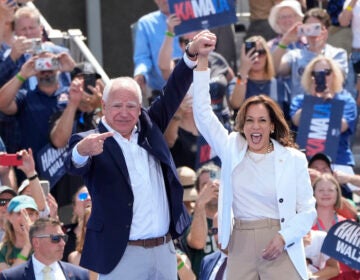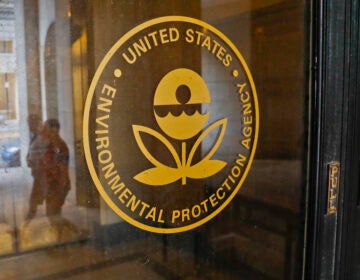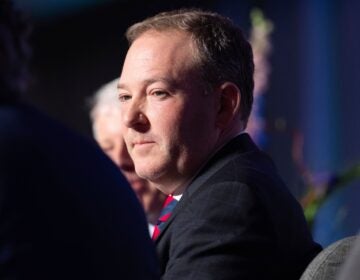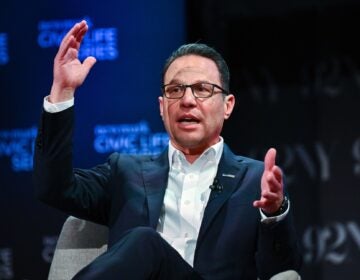Here’s what Harris and Trump said about climate change in the Philly debate
Trump said little about his plans, while Harris bragged about both clean energy investments and gas production.
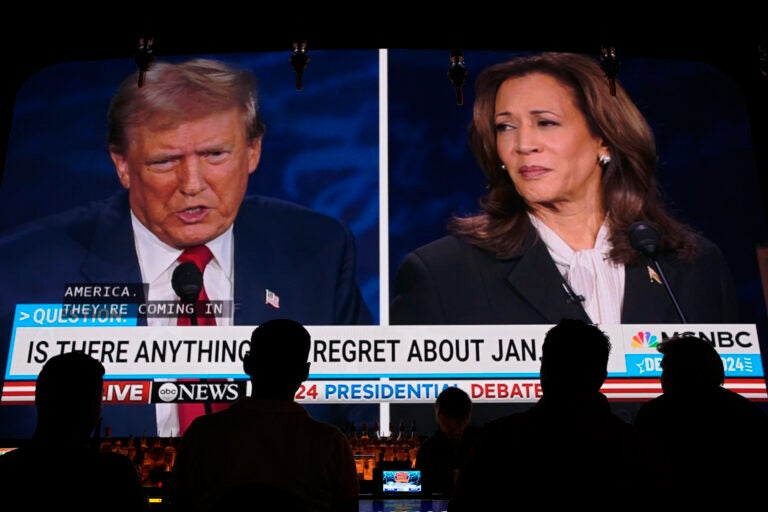
People watch the presidential debate between Republican presidential nominee former President Donald Trump and Democratic presidential nominee Vice President Kamala Harris, Tuesday, Sept. 10, 2024, at the Gipsy Las Vegas in Las Vegas. (AP Photo/John Locher)
This story is part of the WHYY News Climate Desk, bringing you news and solutions for our changing region.
From the Poconos to the Jersey Shore to the mouth of the Delaware Bay, what do you want to know about climate change? What would you like us to cover? Get in touch.
At the debate in Philadelphia Tuesday, a moderator asked Vice President Kamala Harris and former President Donald Trump a question with implications for the future of public health, safety and the economy: What would they do to fight climate change if elected president?
Neither candidate directly answered the question.
Harris acknowledged the impact of climate change on Americans, saying, “it is very real.”
“Ask anyone who lives in a state who has experienced these extreme weather occurrences,” she said.
Harris talked about investments in clean energy under the current Biden administration, but stopped short of describing her own plan for tackling climate change if elected president.
Trump used his time responding to the question to attack the Biden-Harris administration’s record on manufacturing jobs. He promised to put tariffs on foreign-made cars “so they can’t come into our country,” but did not tie the issue back to reducing planet-warming emissions.
Trump has called climate change a hoax
During the debate, Harris said — accurately — that Trump has called climate change a “hoax.”
In 2014, Trump repeatedly used the word to describe global warming on the social media platform X, formerly Twitter. In a 2015 speech, Trump called global warming “a money-making industry.”
“A lot of it’s a hoax,” he said.
But later, in a 2020 debate, he said he believed human pollution contributes to warming “to an extent.”
Scientists say it’s unequivocal that the atmosphere, land and oceans have warmed as a result of human influence.
What else has Trump said about climate change?
Trump has sent mixed messages on climate action. In 2019, as he geared up to pull the United States out of the Paris climate agreement, he bragged that the U.S. had gone beyond other countries in cutting planet-warming greenhouse gas emissions.
But while president, he appointed a climate skeptic to lead his EPA and rolled back a number of climate-related rules, including weakening pollution standards for cars and repealing the Obama-era Clean Power Plan.
If elected to a second term, he claims he would “make America the dominant energy producer in the world, by far,” “cancel the electric vehicle mandate” and “end market-distorting restrictions on oil, natural gas, and coal,” according to the platform on his campaign website.
In 2023, the United States was already the world’s top exporter of liquified natural gas and producer of oil. The Biden-Harris administration has not instituted an electric vehicle mandate — but has pushed for a transition to electric vehicles by developing strict tailpipe pollution limits and pumping federal funding into retooling auto factories.
During Tuesday’s debate, Trump said he is a “big fan of solar,” but claimed solar farms are “not good things for the environment” because of the vast acreage needed for large-scale solar.
“They need a whole desert to get some energy to come out,” he said.
In a post-debate fact-check, the magazine Atmos called the claim “partly true, but misleading,” noting the largest solar project in the U.S. is over 4,000 acres in the Mojave Desert, but that most solar installations are much smaller.
Record gas production and clean energy spending under Biden-Harris
During Tuesday’s debate, Trump claimed he “got the oil business going like nobody has ever done before” and that a Harris win would mean the end of fossil fuels.
“The day after that election, they’ll go back to destroying our country and oil will be dead, fossil fuel will be dead,” he said. “We’ll go back to windmills and we’ll go back to solar.”
But in reality, U.S. oil and gas production hit a record high under Biden. Harris noted this during Tuesday’s debate.
“I am proud that as vice president over the last four years, we have invested a trillion dollars in a clean energy economy while we have also increased domestic gas production to historic levels,” she said.
Trump claimed that if Harris is elected, “fracking in Pennsylvania will end on day one.” While Harris said she was in favor of banning fracking as a primary candidate in 2019, she has since reversed her position.
While a president could ban fracking on federal land, only Congress can ban fracking on private and state land. Pennsylvania’s fracking boom has relied on privately held leases. The state also leases land for oil and gas drilling but there is very little federal land in Pennsylvania available to frack.
Harris cast the tie-breaking vote for the Inflation Reduction Act in 2022. The bill included the largest federal investment in clean energy in U.S. history as well as tax credits for home energy efficiency improvements.
What is Harris’ plan to deal with climate change?
Harris has not yet released a detailed climate plan, but her campaign website says she will “unite Americans to tackle the climate crisis” and “fight for the freedom to breathe clean air, drink clean water, and live free from the pollution that fuels the climate crisis.”
Her website promises she would advance environmental justice, protect public lands, build disaster resilience, lower household energy costs, hold polluters accountable and create “millions of new jobs.”
Her campaign told Axios she “does not support an electric vehicle mandate.”

Saturdays just got more interesting.
WHYY is your source for fact-based, in-depth journalism and information. As a nonprofit organization, we rely on financial support from readers like you. Please give today.



